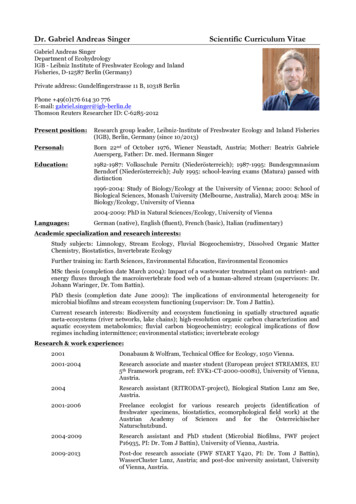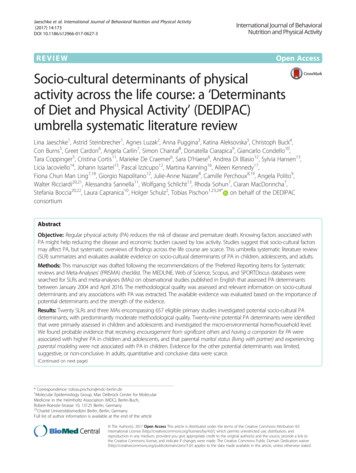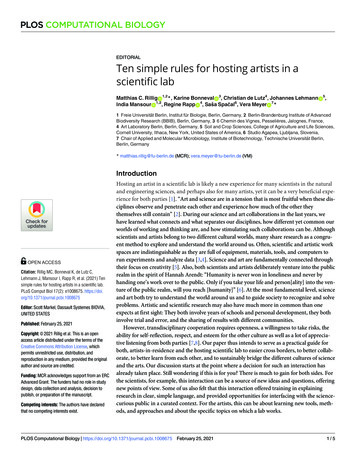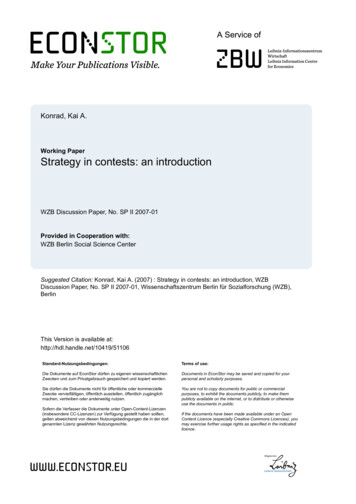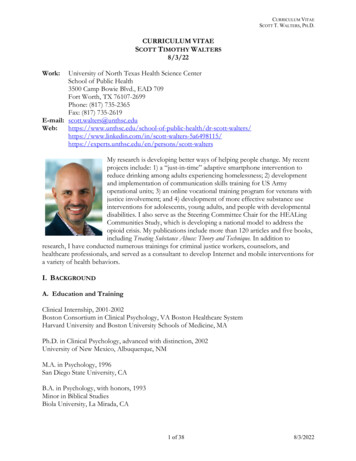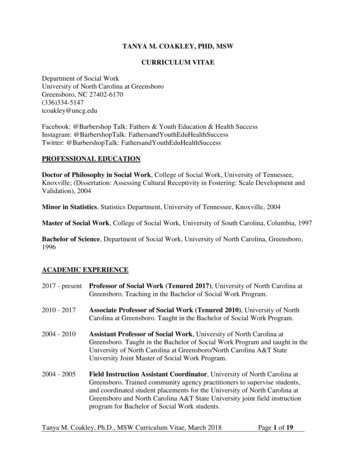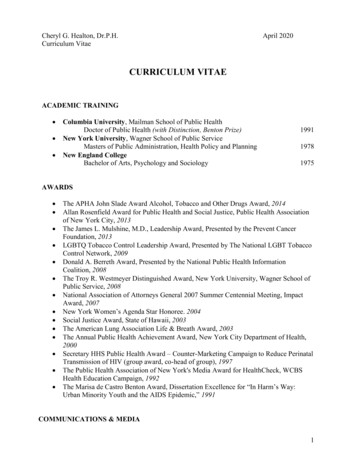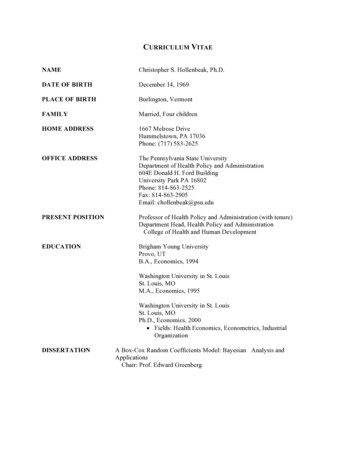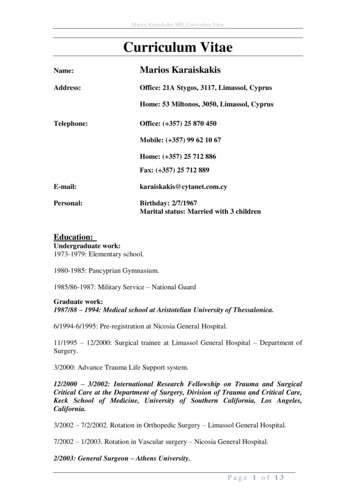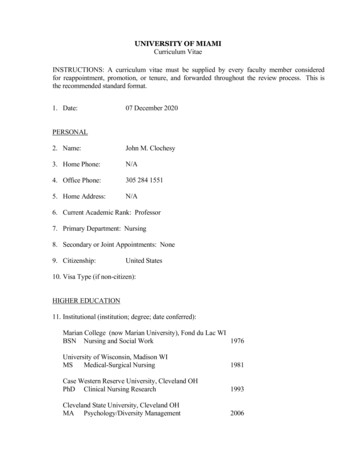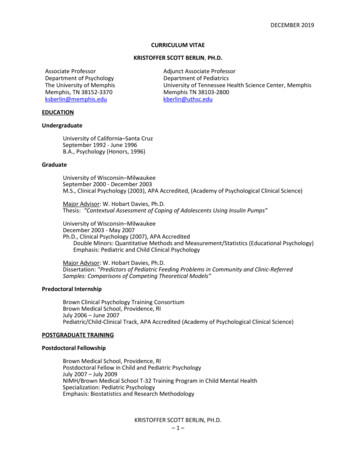
Transcription
DECEMBER 2019CURRICULUM VITAEKRISTOFFER SCOTT BERLIN, PH.D.Associate ProfessorDepartment of PsychologyThe University of MemphisMemphis, TN 38152-3370ksberlin@memphis.eduAdjunct Associate ProfessorDepartment of PediatricsUniversity of Tennessee Health Science Center, MemphisMemphis TN niversity of California–Santa CruzSeptember 1992 - June 1996B.A., Psychology (Honors, 1996)GraduateUniversity of Wisconsin–MilwaukeeSeptember 2000 - December 2003M.S., Clinical Psychology (2003), APA Accredited, (Academy of Psychological Clinical Science)Major Advisor: W. Hobart Davies, Ph.D.Thesis: “Contextual Assessment of Coping of Adolescents Using Insulin Pumps”University of Wisconsin–MilwaukeeDecember 2003 - May 2007Ph.D., Clinical Psychology (2007), APA AccreditedDouble Minors: Quantitative Methods and Measurement/Statistics (Educational Psychology)Emphasis: Pediatric and Child Clinical PsychologyMajor Advisor: W. Hobart Davies, Ph.D.Dissertation: “Predictors of Pediatric Feeding Problems in Community and Clinic-ReferredSamples: Comparisons of Competing Theoretical Models”Predoctoral InternshipBrown Clinical Psychology Training ConsortiumBrown Medical School, Providence, RIJuly 2006 – June 2007Pediatric/Child-Clinical Track, APA Accredited (Academy of Psychological Clinical Science)POSTGRADUATE TRAININGPostdoctoral FellowshipBrown Medical School, Providence, RIPostdoctoral Fellow in Child and Pediatric PsychologyJuly 2007 – July 2009NIMH/Brown Medical School T-32 Training Program in Child Mental HealthSpecialization: Pediatric PsychologyEmphasis: Biostatistics and Research MethodologyKRISTOFFER SCOTT BERLIN, PH.D.–1–
DECEMBER 2019HONORS AND w, American Psychological Association (Div. 54, Society of Pediatric Psychology)Early Career Research Award, The University of MemphisRouth Early Career Award in Pediatric Psychology, Society of Pediatric PsychologySociety of Pediatric Psychology Diversity Research AwardSociety of Pediatric Psychology Outstanding Student Poster Award, First PlaceGraduate School Dissertation Fellowship, University of Wisconsin–MilwaukeeSociety for Pediatric Psychology Student Spotlight AwardWisconsin Psychological Association Graduate Student Research Award, First PlaceChancellor's Golda Meir Library Scholar AwardAmerican Psychological Association Graduate Students Advocacy Coordinating TeamExcellence in Campus Leadership AwardUniversity of Wisconsin–Milwaukee Graduate School Travel AwardWisconsin Psychological Association Graduate Student Research Award, First PlaceWisconsin Psychological Association Graduate Student Research Award, Second PlaceAOP Graduate School Fellowship, University of Wisconsin–MilwaukeeHonors in the Major, Department of Psychology, University of California–Santa CruzPorter College Service Award, University of California–Santa CruzPsi Chi, Honor Society in PsychologyPROFESSIONAL LICENSURE8-12-Current10/09 –8/1207/09 –6/1010/07 –07/9Psychologist with Health Service Provider Designation, Tennessee Board of Examiners inPsychology, License #3091Psychologist, State of Ohio, Board of Psychology, License #6597 (INACTIVE)Psychologist, State of Rhode Island, Department of Health, License # PS01137 (INACTIVE)Psychologist Trainee, State of Rhode Island, Department of Health Temporary License,PST00101 (INACTIVE)APPOINTMENTS (RESEARCH, TEACHING, AND CLINICAL EXPERIENCES)RESEARCH AND TEACHING EXPERIENCE9/16–Current Associate Professor, The University of Memphis, Department of Psychology, Memphis, TN.Undergraduate Courses: Abnormal Child Psychology, Graduate Courses: ClinicalPsychotherapies: Evidence-Based Psychotherapies for Children and Adolescents; ClinicalPsychotherapies: Evidence-Based Interventions In Pediatric (Child Health) Psychology; ChildPsychopathology; Clinical Supervision; Structural Equation Modeling.9/16–Current Adjunct Associate Professor, University of Tennessee Health Science Center, Memphis, TNDepartment of Pediatrics, Division of Pediatric Endocrinology and Metabolism1/12–8/16Assistant Professor, The University of Memphis, Department of Psychology, Memphis, TN.Undergraduate Courses: Abnormal Child Psychology, Graduate Courses: ClinicalPsychotherapies: Evidence-Based Psychotherapies for Children and Adolescents; ClinicalPsychotherapies: Evidence-Based Interventions In Pediatric (Child Health) Psychology; ChildPsychopathology; Clinical Supervision; Structural Equation Modeling.2/15–Current Faculty Affiliate, The University of Memphis, Memphis TN, School of Public HealthKRISTOFFER SCOTT BERLIN, PH.D.–2–
DECEMBER 7/07–7/097/06 –7/078/04 - 8/051/02 - 8/056/01 - 10/018/00 - 6/069/00 - 7/068/00 - 5/028/00 - 6/01Adjunct Assistant Professor, University of Tennessee Health Science Center, Memphis, TNDepartment of Pediatrics, Division of Pediatric Endocrinology and MetabolismAssociate Editor, Behavioral MedicineData Safety Monitoring Board Member, Reducing Stress in Adolescents and Adults withT1D. R34 funded by National Institutes of Health Principal Investigator: Deborah Ellis, PhDAd Hoc Grant Reviewer, Psychosocial Risk and Disease Prevention (PRDP) study section,Risk, Prevention and Health Behavior Integrated Review Group, National Institutes ofHealth.Ad Hoc Grant Reviewer, Special Emphasis Panel/Scientific Review Group, 2017/10 ZDK1GRB-7 (O4) 1, National Institutes of Health.Grant Reviewer, Early Career Reviewer Program, Psychosocial Risk and Disease Prevention(PRDP) study section, Risk, Prevention and Health Behavior Integrated Review Group,National Institutes of Health.Editorial Board, Journal of Clinical Psychology in Medical SettingsEditorial Board, Journal of Pediatric PsychologyAssistant Research Professor, Ohio University, Department of Psychology, Athens, OH.Undergraduate Courses: Abnormal Child and Adolescent Psychology, Health Psychology.Graduate Courses: Clinical Practicum (Child, Health, and Adult) and Child Therapy.Clinical Research Scientist (Biostatistician and Quantitative Methodologist), Center forIntervention Research in Schools, Ohio University, Department of Psychology, Athens, OHNational Institute of Mental Health T-32 Research Fellow, Brown Medical School andBradley/Hasbro Children’s Research Center, Providence, RI.Pediatric Psychology Research Intern, Department of Pediatrics, Hasbro Children’s Hospital,Providence, RI.Objective Child, Adult, and Neuropsychological Assessment Teaching Assistant, Universityof Wisconsin–Milwaukee, Milwaukee, WIFeeding Clinic Research Assistant, Department of Pediatric Gastroenterology, Children'sHospital of Wisconsin, Milwaukee, WIProject Coordinator, Center for Urban Initiatives and Research, University of Wisconsin–Milwaukee, Milwaukee, WIChild Health Research Team Coordinator, University of Wisconsin–Milwaukee, Milwaukee,WIPediatric Psychology Researcher, University of Wisconsin–Milwaukee, Milwaukee, WIChild Health Psychology Project Assistant, University of Wisconsin–Milwaukee, Milwaukee,WITeaching Assistant, University of Wisconsin–Milwaukee, Milwaukee, WICLINICAL EXPERIENCE8/12-current Clinical Supervisor, The University of Memphis, Psychological Services Clinic, Memphis, TN9/09 - 9/11Clinical Supervisor, Ohio University Psychology and Social Work Clinic, Athens, OH9/09 - 9/11Director of Psychosocial Services/Clinical Supervisor, HeartWorks Cardiac and PulmonaryRehabilitation, O’Blenness Hospital, Athens, OHKRISTOFFER SCOTT BERLIN, PH.D.–3–
DECEMBER 20198/10-6/11Director of Health Psychology Services/Clinical Supervisor, The UMA Diabetes/EndocrineCenter Athens, OH7/07-8/09Pediatric Psychology Fellow, Rhode Island Hospital/Hasbro Children’s Hospital, Providence,RIPsychology Intern, Rhode Island Hospital, Butler Hospital, Hasbro Children’s Hospital and7/06 –7/07Bradley Hospital, Providence, RI.9/04 - 8/06Pediatric Psychology Practicum Student—Feeding Clinic, Children's Hospital of Wisconsin,Milwaukee, WI9/04 - 8/06Pediatric Psychology Practicum Student—HIV Clinic, Children's Hospital of Wisconsin,Milwaukee, WI9/04 - 6/06Depression Specialty Research Clinic Therapist, University of Wisconsin–Milwaukee,Milwaukee, WI9/03 - 6/06Psychology Clinic Student Therapist, University of Wisconsin–Milwaukee, Milwaukee, WI9/01 - 6/04Project Ujima Community Therapist, Community Violence Specialty Clinic, University ofWisconsin–Milwaukee, Children's Hospital of Wisconsin, & Medical College of Wisconsin,Milwaukee, WI9/01 - 8/03Psychology Trainee, University of Wisconsin–Milwaukee, Milwaukee, WI9/00 - 5/02Pediatric Psychology Cognitive Behavioral Research Therapist, University of Wisconsin–Milwaukee, Milwaukee, WIMEMBERSHIP IN SOCIETIESAmerican Psychological Association (Member Number 44935807)Association for Behavior Analysis (past member)Association for Behavioral and Cognitive TherapiesSpecial Interest Group: Clinical Research Methods and StatisticsAssociation for Contextual Behavioral SciencePsi Chi, National Honor Society in PsychologySociety of Pediatric PsychologySpecial Interest Group: DiabetesSpecial Interest Group: Pediatric AdherenceSpecial Interest Group: Pediatric GastroenterologySpecial Interest Group: Pediatric ObesitySpecial Interest Group: Pediatric Research & Innovative Statistical Methodologies (Past Co-Chair)GRANTSActive Research Support / Current Activity1. Understanding Deficits in Social Development in Children with Brain Tumors (129462-MRSG-16-05401-PCSM, 07/01/2016 – 06/30/2021). American Cancer Society, Principal Investigator: Victoria W.Willard, PhD. Role: Statistical and Research Methodology Consultant.2. Translating Basic Habituation Research To Childhood Obesity Treatment (1R01DK121360-01, ),National Institutes of Health Principal Investigator: Hollie A. Raynor, PhD, RD. Role: Co-Investigator(Statistical and Research Methodologist)KRISTOFFER SCOTT BERLIN, PH.D.–4–
DECEMBER 20193. Integration of Electrophysiological and Behavioral Economic Models of Reward Among HeavyDrinking Young Adults. 1F31AA027140-01A1 (NRSA, National Institute on Alcohol Abuse andAlcoholism, 6/2019 – 6/2022). Principal Investigator: Samuel F. Acuff, MS. Role: StatisticalSponsor/Mentor.4. The Food Allergy Superheroes Training (Fast) Program: Increasing Adherence To Food Allergy SafetyGuidelines (NIH, 1R21HD098450-01, 07/01/2019 – 06/30/2021). Principal Investigator: ChristopherA. Flessner, PhD. Role: Co-Investigator (Statistical and Research Methodologist)5. Identification of Predictors and Outcomes of Sickle Cell Disease Health Care Transition. K01,NationalInstitutes of Health (5/1/2016 - 4/30/2021). Principal Investigator: Jerlym S. Porter, PhD, MPH. Role:Statistical and Research Methodology Consultant.Completed Research Support6. A meta-analytic investigation of neurocognitive functioning among youth with neurofibromatosis-1.Chancellor's Golda Meir Library Scholar Award, University of Wisconsin-Milwaukee. 2004. Role:Principal Investigator. Direct Costs: 3,750.7. Research Training in Child Mental Health. (5-T32-MH019927-15). The National Institute of MentalHealth. July 2007 to June 2009. Principal Investigator: Gregory Fritz, MD. Role: Research Fellow.8. Testing Obesity Prevention and Treatment Models with Latino and Non-Latino White Families.Society of Pediatric Psychology’s Diversity Research Grant. August 2008. Role: Principal Investigator.Direct Costs: 1,000.9. Modeling Predictors of Accelerated Weight Gain in Low-income Appalachian Children. (RC-11001).Ohio University Office of Research and Sponsored Programs Challenge Grant. 9/2010 to 9/2011.Role: Principal Investigator, Direct Costs: 5000.10. Predicting Resiliency in Youth with Type-1 Diabetes. The University of Memphis Faculty ResearchGrant (July 2013 to July 2014). Role: Principal Investigator. Direct Costs: 6,500.11. Developing a Culturally Tailored Acceptance-Based Behavioral Intervention to Improve GlycemicControl and Quality of Life among Low Income Adolescents with Type 1 Diabetes and their Families.Society of Pediatric Psychology Targeted Research Grant (January 2015-December 2015). Role:Principal Investigator. Direct costs: 10,000.12. Implementing Prevention Plus for childhood overweight and obesity in food secure and insecurefamilies. R34 funded by National Institutes of Health Principal Investigator: Hollie A. Raynor, PhD,RD. Role: Statistical and Research Methodology Consultant.Activity / Pending1. The contribution of family interactions to pediatric weight and feeding problems. (1-F32-HD05680401). The National Institute of Child Health and Human Development. December 2006. Role: PrincipalInvestigator. Scored/Not Funded.2. Testing Obesity Prevention and Treatment Models with Latino and Non-Latino White Families. (1R03-HD061443-01). R03 submitted to the National Institutes of Health, October 2008 (1stsubmission). Role: Principal Investigator, Priority Score: 213, 40th percentile. Not FundedKRISTOFFER SCOTT BERLIN, PH.D.–5–
DECEMBER 20193. Modeling Predictors of Accelerated Weight Gain in Low-income Appalachian Children. (1R03HD067325-01. R03 submitted to the National Institutes of Health, February 2010 (2ndsubmission). Role: Principal Investigator, Priority Score: 27, 16th percentile. Not Funded4. Identifying Predictors of Driving Outcomes in Young Adults with ADHD. (R21 pending resubmission).R21 submitted to the National Institute of Child Health and Human Development, June 2011.Principal Investigator: Julie S. Owens, Ph.D., Role: Statistical and Research Methodology Consultant.Priority Score: 34, 25th percentile.5. Reducing Stroke Risk in Rural Appalachia. R01 submitted to the National Institute of Health, January2013. Principal Investigator: Hollie A. Raynor, Ph.D., Role: Co-Investigator, Statistical and ResearchMethodology Consultant. Priority Score: 43.6. Predictive Risk Profiles of Early Childhood Accelerated Weight Gain and Obesity. (1-R03-HD08114701, pending October 2015 resubmission). R03 submitted to the National Institutes of Health,November 2013. Role: Principal-Investigator, Statistical and Research Methodologist. Priority Score:42, 35th percentile.7. Epigenetic Determinants of Infant Growth and Metabolism.R01 submitted to the National Institutesof Health, June2014. Principal Investigator: Alicia K. Smith, PhD, MPH. Role: Statistical and ResearchMethodology Consultant.8. Profiles of Metabolic Function and Relation Their To Stress In Youth With Overweight And Obesity.R03 submitted to the National Institutes of Health (NIDDK), June 2015. Principal Investigator: Idia B.Thurston, PhD. Role: Co-I (Statistical and Research methodology).9. Timing of energy distribution, chronosynchrony, and long-term weight loss. R01 submitted to byNational Institutes of Health Principal Investigator: Hollie A. Raynor, PhD, RD. Role: Co-Investigator(Statistical and Research Methodologist).10. The contribution of youth and maternal microsocial interactions to pediatric obesity. R15 submissionto the National Institutes of Health, submitted Winter 2016. Role: Principal-Investigator, Statisticaland Research Methodologist. R15 HD090594-01. Impact Score 37.11. The contribution of youth and maternal microsocial interactions to pediatric obesity healthdisparities. R15 submission to the National Institutes of Health, submitted Summer 2017. Role:Principal-Investigator, Statistical and Research Methodologist. Impact Score 3712. Extending Parent Child Interaction Therapy to Early Childhood Obesity. F31 submitted to the NationalInstitutes of Health, September 2017. Principal Investigator: Tiffany M. Rybak, MS. Role: PrimarySponsor/Mentor. Scored, Pending resubmission.13. Development of a Pediatric Feeding and Swallowing Disorder Screening Instrument for Primary CareProviders. R01 submitted to by National Institutes of Health. Principal Investigator: Alan H.Silverman, PhD. Role: Co-Investigator (Statistical and Research Methodologist).PUBLICATIONS LISTORIGINAL PEER–REVIEWED PUBLICATIONS (*Student/Trainee Author)1. Berlin, K. S., Sass, D. A., Davies, W. H., & Hains, A. A. (2002). Impact of diabetes disclosure onperceptions of eating and self-care behaviors. Diabetes Educator, 28, 809-816.KRISTOFFER SCOTT BERLIN, PH.D.–6–
DECEMBER 20192. Davies, W. H., Berlin, K. S., & Telega, G. (2003). Common stressors among adults with celiac disease.Celiac Sprue Association Lifeline, 23, 16.3. Berlin, K. S., Sass, D. A., Davies, W. H., Reupert, S. R., & Hains, A. A. (2005). Brief Report: Parentperceptions of hypoglycemic symptoms of youth with diabetes; disease disclosure minimizes risk ofnegative evaluations. Journal of Pediatric Psychology, 30, 207-212. doi:10.1093/jpepsy/jsi0084. Berlin, K. S., Sass, D. A., Davies, W. H., Jandrisevits, M. D., & Hains, A. A. (2005). Cystic fibrosisdisclosure may minimize risk of negative peer evaluations. Journal of Cystic Fibrosis, 4,169-174. doi:10.1016/j.jcf.2005.05.0125. Berlin, K. S., Davies, W. H., Jastrowski, K. E., Hains, A. A., Parton, E., & Alemzadeh, R. (2006).Contextual assessment of problematic situations identified by adolescents using insulin pumps andtheir parents. Families, Systems, & Health, 24, 33-44. doi:10.1037/1091-7527.24.1.336. Davies, W. H., Satter, E., Berlin, K. S., Sato, A. F., Silverman, A. H., Fischer, E. A., Arvedson, J., &Rudolph, C. D. (2006). Reconceptualizing feeding and feeding disorders in interpersonal context: Thecase for a relational disorder. Journal of Family Psychology, 3, 409-417. doi:10.1037/08933200.20.3.4097. Hains, A. A., Berlin, K. S., Davies, W. H., Parton, E. A., & Alemzadeh, R. (2006). Attributions ofadolescents with type 1 diabetes in social situations: Relationship with expected adherence,diabetes stress, and metabolic control. Diabetes Care, 29, 818-822.doi:10.2337/diacare.29.04.06.dc05-18288. Marcks, B. A, Berlin, K. S., Woods, D. W., & Davies, W. H. (2007). A preliminary investigation of theimpact of tourette’s syndrome disclosure on peer perceptions and social functioning. Psychiatry, 70,59-67. doi: 10.1521/psyc.2007.70.1.599. Hains, A. A., Berlin, K. S., Davies, W. H., Smothers, M. K., Sato, A. F., & Alemzadeh, R. (2007)Attributions of adolescents with type 1 diabetes related to performing diabetes care around friendsand peers: The moderating role of friend support. Journal of Pediatric Psychology, 32, 561-570.doi:10.1093/jpepsy/jsl04010. Jastrowski, K. E., Berlin, K. S., Sato, A. F., & Davies, W. D. (2007). Disclosure of attention deficithyperactivity disorder may decrease social rejection. Psychiatry, 70, 273-282.doi:10.1521/psyc.2007.70.3.27411. Kanter, J., W., Mulick, P., Busch, A. M, Berlin, K. S., & Martel, C. (2007). The Behavioral Activation forDepression Scale (BADS): Psychometric properties and factor structure. Journal of Psychopathologyand Behavioral Assessment, 29, 191-202. doi:10.1007/s10862-006-9038-512. Sato, A. F., Berlin, K. S., Hains, A. A., Davies, W. H., Smothers, M. K., Clifford, L. M., & Alemzadeh, R.(2008). Teacher support of adherence for adolescents with type 1 diabetes: Preferred teacherssupport behaviors and youth’s perceptions of support. Diabetes Educator, 34, 866-873.doi: 10.1177/014572170832285813. Hains, A. A., Berlin, K. S., Davies, W. H., Sato, A. F., Smothers, M. K., Clifford, L. C., & Alemzadeh, R.(2009). Attributions of teacher reactions to diabetes self-care. Journal of Pediatric Psychology, 34,97-107. doi:10.1093/jpepsy/jsn041KRISTOFFER SCOTT BERLIN, PH.D.–7–
DECEMBER 201914. Berlin, K. S., Davies, W. H., Lobato, D. J., & Silverman. A H. (2009). A biopsychosocial model ofnormative and problematic pediatric feeding. Children’s Health Care, 38, 263–282.doi:10.1080/0273961090323598415. Busch, A. M., Kanter, J. W., Callaghan, G. M., Weeks, C. E, Baruch, D. E., & Berlin, K. S. (2009). Amicro-process analysis of Functional Analytic Psychotherapy’s mechanism of change. BehaviorTherapy, 40, 280-290. doi:10.1016/j.beth.2008.07.00316. Berlin, K. S., Davies, W. H., Silverman, A. H., Woods, D. W., Fischer, E. A., & Rudolph, C. D. (2010).Assessing children’s mealtime problems with the Mealtime Behavior Questionnaire. Children’sHealth Care, 39, 142-156. doi:10.1080/0273961100367995617. Sato, A. F., Davies, W. H., Berlin, K. S., Simon, K., Khan, K. A., & Weisman, S. J. (2010). Assessingsocial consequences in pediatric chronic pain: A confirmatory approach to exploring the factorstructure of the Social Consequences of Pain Questionnaire. Journal of Pediatric Psychology, 35, 611616. doi:10.1093/jpepsy/jsp07518. Luzier, J., L. Berlin, K. S., & Weeks, J. W. (2010). Behavioral treatment of pediatric obesity: Reviewand future directions. Children’s Health Care, 39 312-334. doi:10.1080/02739615.2010.51620219. MacLaren-Chorney, J., Garcia, A. M., Berlin, K. S., Bakeman, R., & Kain, Z. M. (2010). Time windowsequential analysis: An introduction for pediatric psychologists. Journal of Pediatric Psychology, 35,1061-1070. doi: 10.1093/jpepsy/jsq02220. Berlin, K. S., Lobato, D. J., Pinkos, B., Cerezo, C., & LeLeiko, N. S. (2011). Patterns of medical anddevelopmental comorbidities among children presenting with feeding problems: A latent classanalysis. Journal of Developmental and Behavioral Pediatrics, 32, 41-47.doi:10.1097/DBP.0b013e318203e06d21. Berlin, K. S., Davies, W. H., Silverman, A. H., & Rudolph, C. D. (2011). Assessing family-based feedingstrategies, strengths, and mealtime structure with the Feeding Strategies Questionnaire. Journal ofPediatric Psychology, 36, 586–595. doi:10.1097/DBP.0b013e318203e06d22. Heckman, B. D., Berlin, K. S., Heckman, T. G., & Feaster, D. J. (2011). Psychometric characteristicsand race-related measurement invariance of stress and coping measures in adults with HIV/AIDS.AIDS and Behavior, 15, 441-453. doi: 10.1007/s10461-010-9854-123. Heckman, B. D., Berlin, K. S., Watakakosol, R., & St. Pierre, V. (2011). Cross-ethnic validity andinvariance analyses of psychosocial headache measures in Caucasian and African Americanheadache patients. Cephalalgia, 31, 222-234. doi: 10.1177/033310241037242924. Przeworski, A., Newman, M. G., Pincus, A. L., Kasoff, M. B., Yamasaki, A. S., Castonguay, L. G., &Berlin, K. S. (2011). Interpersonal pathoplasticity in individuals with generalized anxiety disorder.Journal of Abnormal Psychology, 120, 286-298. doi:10.1037/a002333425. Berlin, K. S., Rabideau, E. M., & Hains, A. A. (2012). Empirically derived patterns of perceived stressamong youth with type 1 diabetes and relationships to metabolic control. Journal of PediatricPsychology, 37. 990-998. doi:10.1093/jpepsy/jss08026. Brady, C. E., Evans, S. W., Berlin, K. S., Bunford, N. & Kern, L. (2012). Evaluating school impairmentwith adolescents: A psychometric evaluation of the classroom performance survey. SchoolPsychology Review, 41, 429-446.KRISTOFFER SCOTT BERLIN, PH.D.–8–
DECEMBER 201927. Berlin, K. S., Hamel-Lambert, J., & DeLameter, C. D. (2013). Obesity and overweight status healthdisparities among low-income rural Appalachian preschool children. Children’s Health Care, 42(1),15-26. doi: 10.1080/02739615.2013.75381228. Medrano, G. R., Berlin, K. S., & Davies, W. H. (2013). Assessing the reliability and validity of thePedsQL Family Impact Module in a community sample. Quality of Life Research, 22, 2899-2907.doi:10.1007/s11136-013-0422-929. Silverman, A. H., Noel, R., Kirby, M., Clifford, L. M., Berlin, K. S., & Rudolph, C. D. (2013). Nutritionaland psychosocial outcomes of gastrostomy tube-dependent children completing an intensiveinpatient behavioral treatment program. Journal of Pediatric Gastroenterology and Nutrition, 57,668-672. doi:10.1097/MPG.0b013e3182a027a330. Berlin, K. S. (2014). Routh early career award: From pediatric ninjutsu to pediatric psychology.Journal of Pediatric Psychology, 39, 265-270. doi:10.1093/jpepsy/jst13931. Berlin, K. S., Parra, G. R., & Williams, N. A. (2014). An Introduction to latent variable mixturemodeling (part 2): Longitudinal latent class growth and growth mixture models. Journal of PediatricPsychology, 39, 188-203. doi:10.1093/jpepsy/jst08532. Berlin, K. S., Williams, N. A., & Parra, G. R. (2014). An introduction to latent variable mixturemodeling (part 1): Cross sectional latent class and latent profile analyses. Journal of PediatricPsychology, 39, 174-187. doi:10.1093/jpepsy/jst08433. Buscemi, J., Murphy, J. G., Berlin, K. S., & Raynor, H. A. (2014). A behavioral economic analysis ofchanges in food-related and food-free reinforcement during weight loss treatment. Journal ofConsulting and Clinical Psychology, 82, 659-669. DOI: 10.1037/a003637634. Jelalian, E., Foster, G., D. Sato, A. F., Berlin, K. S., McDermott, C., & Sundal, D. (2014). Treatmentadherence and facilitator characteristics in a community based pediatric weight controlintervention. International Journal of Behavioral Nutrition and Physical Activity, 11:17.doi:10.1186/1479-5868-11-1735. Karazsia, B. T., Berlin, K. S., Armstrong, B., Janicke, D., & Darling, K. W. (2014). Integrating mediationand moderation to advance theory development and testing. Journal of Pediatric Psychology, 39,163-173. doi: 10.1093/jpepsy/jst08036. Karazsia, B. T. & Berlin, K. S. (2014). Adding practical tools to our toolbox: Introduction to the specialissue on quantitative methodologies. Journal of Pediatric Psychology, 39, 121-123. doi:10.1093/jpepsy/jsu00137. Katz, L. & Berlin, K. S. (2014). Psychological stress in childhood and the development of myopia.Optometry & Visual Performance, 2, 289-29638. Kamody, R. C., Berlin, K. S., Hains, A. A., Kichler, J. C., Davies, W. H., Diaz-Thomas, A. M., & Ferry, R.jr. (2014). Assessing measurement invariance of the Diabetes Stress Questionnaire in youth withtype 1 diabetes. Journal of Pediatric Psychology, 39, 1138-1148. doi: 10.1093/jpepsy/jsu07639. Berlin, K. S., Kamody, R. C., Banks, G. G., Davies, W. H., & Silverman, A. H. (2015). Empirically derivedparental feeding styles for young children and their relations to weight, mealtime behaviors, andchildhood behavior problems: A latent profile analysis. Children’s Health Care, 44, 136-154.DOI:10.1080/02739615.2014.891207KRISTOFFER SCOTT BERLIN, PH.D.–9–
DECEMBER 201940. Berlin, K. S., Hains, A. A., Kamody, R. C., Kichler, J. C., & Davies, W. H. (2015). Differentiating peerand friend social information-processing effects on stress and glycemic control among youth withtype 1 diabetes. Journal of Pediatric Psychology, 40, 492-499. doi: 10.1093/jpepsy/jsu11141. Silverman, A. H., Berlin, K. S., Mugie, S., DiLorenzo, Kamody, R. C., Nurko, S., Ponnambalam, Gorges,C., Sanghavi, & Sood, M. R. (2015). Measuring Health-Related Quality of Life with the ParentalOpinions of Pediatric Constipation Questionnaire. Journal of Pediatric Psychology, 40, 814-824. doi:10.1093/jpepsy/jsv02842. Lang, K. P., Veazey-Morris, K., Berlin, K. S., & Andrasik, F. A. (2016). Factors affecting health careutilization in OEF/OIF veterans: The impact of PTSD and pain. Military Medicine, 181, 50-55. DOI:http://dx.doi.org/10.7205/MILMED-D-14-0044443. Tillery, R., T., Berlin, K. S., Banks, G. G., Kamody, R. C., & Rybak, T. M. (2016). Relations betweenchildren’s internalizing symptoms and non-linear changes in children’s body mass index fromkindergarten to eighth grade. Journal of Pediatric Psychology, 41, 340-349.44. Banks, G. G., Berlin, K. S., Rybak, T. M., Kamody, R. C., & Cohen, R. (2016). Disentangling thelongitudinal relations of race, sex, SES, for childhood Body Mass Index trajectories. Journal ofPediatric Psychology, 41, 453-461.45. Buscemi, J. Berlin, K.S., Rybak, T. M., Schiffer, L. A., Kong, A., Stolley, M. R., Blumstein, L., OdomsYoung, A., Fitzgibbon, M. L. (2016). Health behavior and weight changes among racial and ethnicminority preschoolers and their parents: Associations across 1 year. Journal of Pediatric Psychology,41, 777-785.46. Berlin, K. S., Kamody, R. C., Thurston, I. B., Banks, G. G., Rybak, T. M., & Ferry, R. J. (2017). PhysicalActivity, Sedentary Behaviors, and Nutritional Risk Profiles and Relations to Body Mass Index,Obesity, and Overweight in Eighth Grade. Behavioral Medicine, 43, 31-39. DOI:10.1080/08964289.2015.103995647. Berlin, K. S., Karazsia, B. T., & Klages, K. L. (2017). Research Design in Pediatric Psychology: The Stateof our Science, Recommendations, and Future Considerations. In M. Roberts & R. Steele (Eds.)Handbook of Pediatric Psychology, 5th Edition. New York, Guilford Press.48. Buscemi, J., Rybak, T. M., Berlin, K. S., Murphy, J. G., & Raynor, H. A. (2017). Impact of food cravingand calorie intake on body mass index changes during an 18 month behavioral weight loss trial.Journal of Behavioral Medicine, 40, 565-573.49. Defenderfer, E. K., Rybak, T. M., Davies, W. H., & Berlin, K. S. (2017). Predicting parent healthrelated quality of life: Evaluating conceptual models. Quality of Life Research, 26, 1405-1415.50. Klages, K. L., Berlin, K. S. Silverman, A., Mugie, S., Di Lorenzo, C., Nurko, S., Ponnambalam, A.,Gorges, C., Sanghavi, R., & Sood, M. (2017). Empirically derived patterns of pain, stool frequency,and incontinence, and their relations to health related quality of life among youth with chronicconstipation. Journal of Pediatric Psychology, 42, 325-334.51. Leahy, K., Berlin, K. S., Banks, G. G., & Bachman, J. (2017). The relationship between intuitive eatingand postpartum weight loss. Maternal and Child Health Journal, 21, 1591-1597.KRISTOFFER SCOTT BERLIN, PH.D.– 10 –
DECEMBER 201952. Rybak, T.M., Ali, J.S., Berlin, K.S., Klages, K.L., Banks, G. G., Kamody, R.C., Ferry, R.J., Alemzadeh, R.,& Diaz-Thomas, A.M. (2017). Patterns of family functioning and diabetes specific conflict in relationto health and psychosocial outcomes among youth with type 1 diabetes. Journal of PediatricPsychology, 42, 40-51.53. Tillery, R. Cohen, R. Berlin, K. S., Long, A. & Phipps, S. (2017). Youth’s adjustment to cancer:Examination of patterns of adjustment and
Department of Pediatrics . University of Tennessee Health Science Center, Memphis . Memphis TN 38103 -2800 . . Ohio University, Department of Psychology, Athens, OH. . The UMA Diabetes/Endocrine Center Athens, OH 7/07-8/09 :
